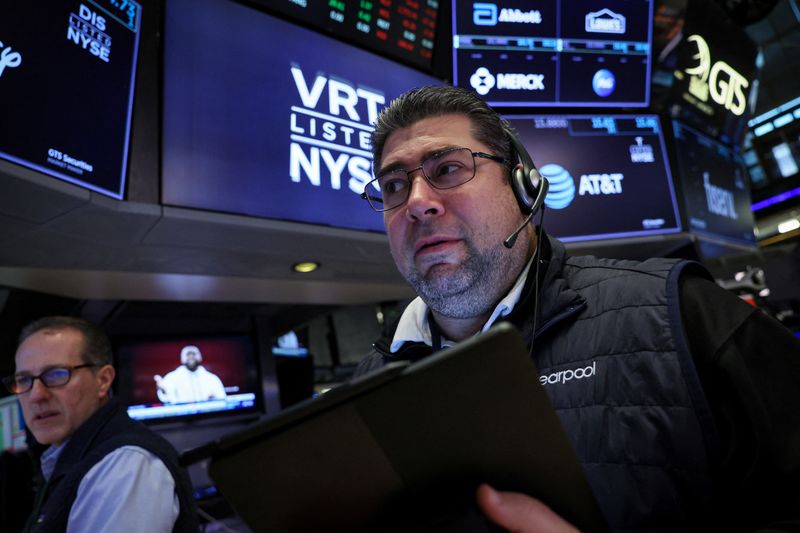By Stephen Culp
NEW YORK (Reuters) - U.S. stocks edged lower on Wednesday as a robust upward GDP revision eased recession fears, while Federal Reserve officials' remarks raised questions about the duration of the central bank's restrictive policy.
The Nasdaq joined the S&P 500 in negative territory, while the Dow ended nominally higher, as investors took a wait-and-see position ahead of Thursday's crucial personal consumption expenditure (PCE) inflation report.
Despite the indexes' languid movement over the last three sessions, November has been a banner month. The S&P 500 remains on track to notch its biggest monthly percentage gain since July 2022.
"The market has had huge returns, so there's certainly profit taking and repositioning; there's some consolidation going on here," said Tim Ghriskey, senior portfolio strategist Ingalls & Snyder in New York. "We've had very strong earnings and there's a lot of optimism. And because of that, there's a repositioning of gains."
In contrast to Barkin, Fed Governor Christopher Waller, widely considered a hawk, provided reassurance on Tuesday that the Fed has probably reached the end of its rate hike cycle. He hinted at the possibility of cutting rates in the near term to engineer a "soft landing" and avoid recession.
"The Fed's on hold now, but the mantra is still higher for longer," Ghriskey added. "The economy continues to be relatively strong. There's no reason for the Fed to lower rates and risk a re-emergence of inflation."
Indeed, on Wednesday Cleveland Fed President Loretta Mester reiterated the central bank's need to remain "nimble" in its response to economic data.
Earlier in the session the Commerce Department upwardly revised its initial estimate on third-quarter gross domestic product, which underscored U.S. economic resilience but also appeared to give the Fed little reason to start cutting rates in the near future, as long as inflation remains well above its 2% target.
The Fed's Beige Book, which provides a region-by-region snapshot of the U.S. economy, was released mid-afternoon, showing economic activity has slowed modestly under the central bank's restrictive monetary policy.
The Dow Jones Industrial Average rose 13.44 points, or 0.04%, to 35,430.42, the S&P 500 lost 4.31 points, or 0.09%, at 4,550.58 and the Nasdaq Composite dropped 23.27 points, or 0.16%, to 14,258.49.
Among the 11 major sectors of the S&P 500, real estate and financial notched the largest percentage gains, while communications services dropped 1.1%.
Interest rate sensitive momentum stocks, led by Microsoft Corp (NASDAQ:MSFT) and Apple Inc (NASDAQ:AAPL) were the heaviest weights on the S&P 500.
Shares of Humana Inc (NYSE:HUM) and Cigna (NYSE:CI) Group were down 5.5% and 8.1%, respectively, after a source familiar with the matter said the health insurers are in talks to merge.
General Motors (NYSE:GM) jumped 9.4% after the automaker announced a $10 billion share buyback and a 33% dividend boost. Ford Motor (NYSE:F) Co shares advanced 2.1%.
CrowdStrike Holdings (NASDAQ:CRWD) surged 10.4% following its consensus-beating fourth-quarter revenue forecast.
NetApp (NASDAQ:NTAP) leaped 14.6% after the cloud-based data management platform increased its annual profit forecast.
Advancing issues outnumbered decliners on the NYSE by a 2.06-to-1 ratio; on Nasdaq, a 1.51-to-1 ratio favored advancers.

The S&P 500 posted 30 new 52-week highs and one new low; the Nasdaq Composite recorded 82 new highs and 97 new lows.
Volume on U.S. exchanges was 11.42 billion shares, compared with the 10.45 billion average for the full session over the last 20 trading days.